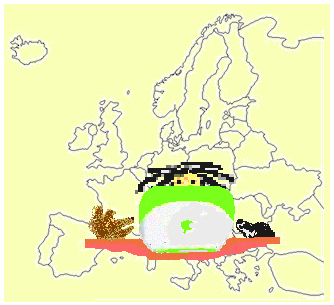

March 9, 2001 was International Women's Day, as declared by the United Nations. Several of us took off work a little early and went down to the beautiful old pink town hall of Bonn for a reception recognizing the day by the mayor of Bonn (a woman, by the way). The building is lovely, and inside were very well-dressed women, mostly middle-aged, drinking champagne. We listened to the mayor and another speaker, both of whom emphasized that this was the International Year of Volunteers (at least that's what I was told -- both spoke only in German).
Afterwards, we went to a cafe for crépes and beer. The conversation flowed through various subjects: jokes about how women really are in charge, but we don't want men to realize it. About how appalled one of our group was that one of the people we worked with recently is a traditional Muslim, and his wife does not leave home without him. About how great it is that women now retain their own property after marrying someone in Spain.
And then I mentioned the word feminist. I don't remember who I was calling a feminist. But one of the women tilted her head and said, "Oh, you are a feminist?" Everyone of our table was now looking at me.
"Um, yeah. So are you."
The heads began to shake.
"Oh, no, I'm not a feminist."
I'm sitting in a café on International Women's day with five professional women, all associated with the U.N., the entity that created this day, all who are so happy at the progress women have made, and who all feel women still have a ways to go to reach equality... and who do not believe they are feminists.
"Feminists are large, manly women."
"Feminists believe women are better than men."
"Feminists aren't feminine."
I don't know if I can convey just how stunned I was at this conversation. That these women, all of whom absolutely embody feminism, would be so quick to distance themselves from the word 'feminist' shows just how effective the U.S.-based religious right has been at demonizing this word. And how just effective extreme feminists have been at demonizing the word as well.
When I was active in the abortion-rights movement in San José, I was told I was not a feminist. I was told this by a woman who believed the only way to ensure the right to choose was to stand and scream back at Operation Rescue outside of health clinics. I was working with a group that concentrated on legislation and law enforcement, I was wearing makeup and a skirt, I didn't like to scream -- I was not a feminist.
I have a definition of feminism, and here it is:
If you celebrate International Women's Day, you are a feminist.
If you vote based on your own opinions, not just because of what your husband or father vote for, you are a feminist.
If you believe equal work should result in equal pay for men and women, you are a feminist.
If you believe women should have equal access to educational and career opportunities as men, you are a feminist.
If you believe women should have a say in their own destinies, you are a feminist.
If you believe women should be in control of their own bodies and health care decisions, not the government, you are a feminist.
Whether you are a stay-at-home mom or a dress-wearing lipstick-loving party girl or a church-going conservative-dressing grandmother or a cross-dressing short-haired militant or a Republican or a Democrat or skinny or fat or live in the city or live in the country -- if you believe any of these things, you are, indeed, a feminist.
So, how can we take this word back? How can we make it something not to be ashamed of, but something to be celebrated? Something to be proud of?
More later . . .
Disclaimer: Any activity incurs risk. The author assumes no responsibility for the use of information contained within this document.
This material is provided as is, with no expressed or implied warranty.
Permission is granted to copy, present and/or distribute a limited amount of material from my web site without charge if the information is kept intact and is credited to Jayne Cravens
Please contact me for permission to reprint, present or distribute these materials (for instance, in a class or book or online event for which you intend to charge).
The personal opinions expressed on this page are solely those of Ms. Cravens, unless otherwise noted.